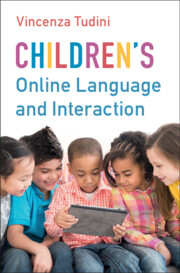Book contents
- Children’s Online Language and Interaction
- Children’s Online Language and Interaction
- Copyright page
- Dedication
- Contents
- Figures and Tables
- Preface
- Acknowledgements
- Transcription Conventions
- 1 What Is Talk and Why Do Children Need It?
- 2 Beyond Emotions: Emoji Talk
- 3 Penguin Talk
- 4 Video Game Talk
- 5 Minecraft Interaction
- 6 Children’s YouTube Comments on Ethan Gamer
- 7 Online Grooming Talk
- 8 Summary of Findings, Implications, and Guidelines
- Appendix: Data Table
- References
- Index
3 - Penguin Talk
Published online by Cambridge University Press: 19 December 2024
- Children’s Online Language and Interaction
- Children’s Online Language and Interaction
- Copyright page
- Dedication
- Contents
- Figures and Tables
- Preface
- Acknowledgements
- Transcription Conventions
- 1 What Is Talk and Why Do Children Need It?
- 2 Beyond Emotions: Emoji Talk
- 3 Penguin Talk
- 4 Video Game Talk
- 5 Minecraft Interaction
- 6 Children’s YouTube Comments on Ethan Gamer
- 7 Online Grooming Talk
- 8 Summary of Findings, Implications, and Guidelines
- Appendix: Data Table
- References
- Index
Summary
Chapter 3 focuses on massively multiplayer online game and chat software Club Penguin that was popular with children until the desktop version was closed down in 2018. The chapter reveals unique aspects of Club Penguin chat environments, including evanescent posts which constrain interaction due to users’ lack of access to review of their conversation. The analysis of Club Penguin chat interaction distinguishes between open conversation, which is similar to ordinary conversation but in written form, role-play and more structured play-oriented social interaction, which is constrained by game rules. The chapter identifies available linguistic resources to ascertain their potential to create naturalistic conversational sequences and routines. The analysis of real life chats reveals that children use the restricted language creatively and effectively in social interaction and virtual play with other users, with greater variety of linguistic devices and negotiations evident in small group exchanges. Some of these exchanges include negotiations related to inclusion of other children, which suggest that this environment may provide opportunities for children’s social development, ideally under adult supervision. Linguistic analysis in fact indicates that despite the software’s linguistic restrictions, which are intended to promote safety, children’s safety can be elusive when users deploy ambiguous polysemic vocabulary.
Keywords
- Type
- Chapter
- Information
- Children's Online Language and Interaction , pp. 57 - 77Publisher: Cambridge University PressPrint publication year: 2025

